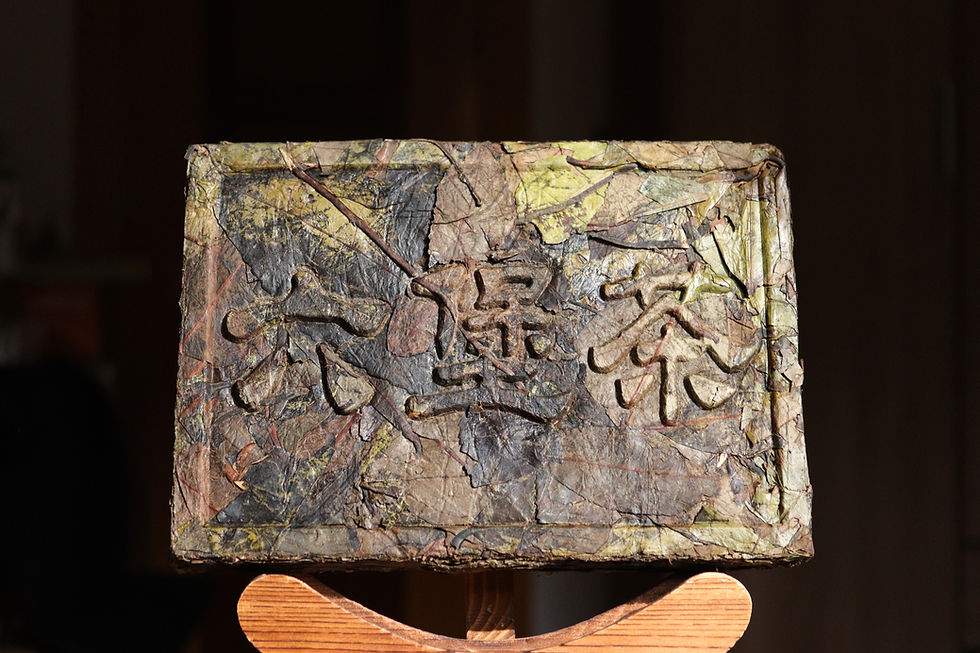Notice: This tea is also available in Art Tea - The Trans-Siberian Lovers, in which it comes with a discount when combined with other options.
Phalap (or Falap) is a mysterious Indian tea, distinct from any mainstream tea in the country. It is uniquely filled into bamboo tubes, smoked, and undergoes a post-fermentation process for months or even years. Handcrafted for centuries, Phalap is a unique tradition of both the Singpho tribe in the Tinsukia district of Assam state (the origin of our 2014 Phalap) and the Tangsa community in the Changlang district of Arunachal Pradesh state. Singpho and Tangsa people produce it for family consumption and occasionally sell it among themselves within their own community. Besides being a traditional drink of daily life, Phalap is also an integral part of the social and religious ceremonies of these Sino-Burmese communities, who believe that they migrated from somewhere nowadays in Mongolia, through Yunnan Province of China, then to Myanmar and finally in the beginning of 13th century settled in India. And surprisingly, Phalap remains relatively unknown to the broader Indian population even today.
According to the production method, Phalap evidently falls into the dark tea category. While there appear to be certain regional variations, the production process is essentially similar among the Singpho tribe and Tangsa community. The harvest of the local Assam varietal (Camellia Sinensis var. assamica) begins with withering; then, it is pan-fried in a wok, similar to the "Shaqing" process in Chinese tea production. Following this, the leaves are dried on fire or by sun, then stuffed into bamboo tubes and compacted tightly over a fire. The post-fermentation process takes place during the aging period when stored in a smoky environment over a fireplace, resulting in the best flavor when properly aged.
Due to the characteristics of the assamica varietal and the high extraction rate resulting from tea leaves being crushed when stuffed into bamboo in a dry state, Phalap is naturally a bitter tea. Traditionally boiled at a very high tea/water ratio for an extended duration in Singpho and Tangsa communities, it results in intense bitterness that is challenging for those accustomed to orthodox Indian tea or Chinese dark tea. We've developed specific parameters for Gongfu brewing method and for boiling to unlock a delightful liquor with its unique flavors and aromas, such as notes of pinewood and caramel, etc. The tea slightly maintains a pleasant bitterness, with medicinal undertones when steeped more robustly, and a subtle hint of honey as it mellows down. As a tea that undergoes smoking during production and is stored in a smoky environment, surprisingly, the smokiness that is discernible in the first infusion is not emphasized from the second infusion onwards.
2014 Phalap - Smoked Indian Dark Tea
Production: 2014
Origin: Tinsukia >> Assam >> India
Aging: in India until April 2023
Launch Date: Dec 20th, 2023
Gongfu Style:
3g/100ml/100ºC
Rinse; steep until the tea chunk approximately loosens up in the first infusion, which can vary between 3-20 seconds or even more, depending on the size of the chunk and how tightly it is compressed; pour out immediately (1-3s) since the 2nd; from the 5th or 6th, increase the steeping time by several seconds in each infusion.
For boiling:
Bring 400ml of water to a boil, add 3g of tea, then reduce heat and simmer for 3-6 minutes until it reaches your desired strength; remove the tea strainer and serve. The same portion can be boiled again using the same procedure.





























